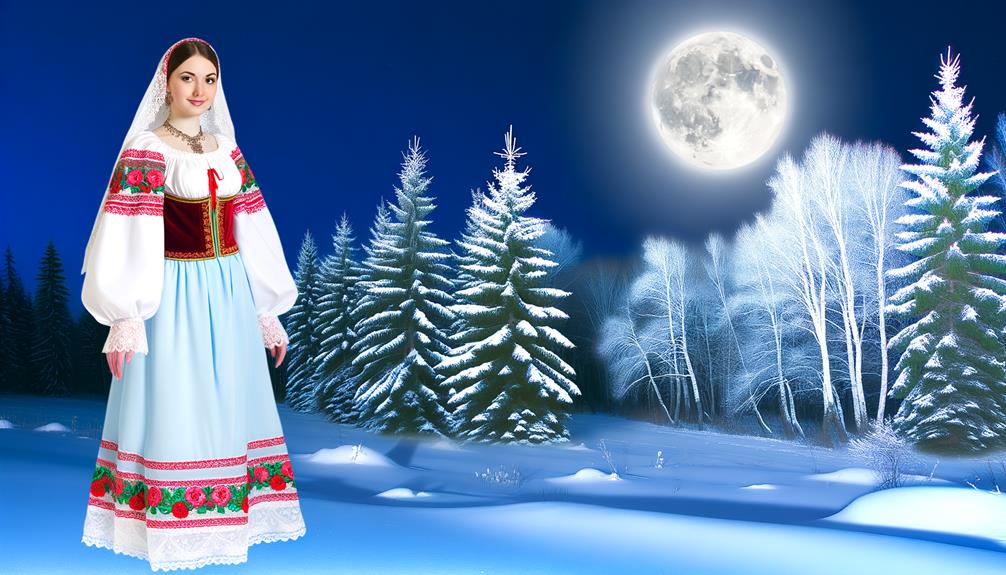Meaning and Origin of the Name Natasha
The name Natasha originates from the Latin name 'Natalia,' signifying 'birthday' or 'Christmas Day.' It derives from the Latin term 'natalis,' associated with birth, and evolved into Natasha within Slavic linguistic traditions. Historically, it has been popular in Eastern Orthodox Christian cultures and has crossed over geographic boundaries to gain widespread recognition.
The name's resonance is reflected in literature, such as Leo Tolstoy's 'War and Peace' and modern media through characters like Marvel's Natasha Romanoff. Its timeless charm and versatility make it a unique choice.
Delving into its cultural significance reveals its enduring appeal.

Key Takeaways
- Natasha originates from the Latin name 'Natalia,' meaning 'birthday' or 'Christmas Day.'
- The name evolved through the Slavic linguistic tradition, transforming from 'Natalia' to 'Natasha.'
- Natasha symbolizes timelessness and versatility in literature, film, and global traditions.
- It became popular in Eastern Orthodox Christian cultures and later gained broader appeal in Europe and the West.
- The name's adaptability reflects a blend of tradition with modern elegance.
Etymology of Natasha
The name Natasha originates from the Latin name 'Natalia,' which means 'birthday' or 'Christmas Day' in reference to the birth of Christ. This etymological root signifies its association with the Latin term 'natalis,' which pertains to birth.
The name Natalia evolved through the Slavic linguistic tradition, where it transformed into Natasha. This transformation showcases the adaptive nature of language and naming conventions over time. The phonetic shift from 'Natalia' to 'Natasha' is characteristic of the morphological changes typical in the Slavic languages.
This evolution underscores the interplay between linguistic structures and cultural influences, leading to the name's modern form. Importantly, Natasha maintains its original connotation related to birth and celebration, encapsulating its rich historical lineage.
Cultural Significance
Natasha's cultural significance is multifaceted, encompassing its presence in literature, film, and various global traditions. This name evokes a sense of timelessness and versatility, often linked with strong, dynamic characters and rich cultural narratives. Its widespread usage highlights its adaptability across different cultural contexts.
- Literature: Natasha Rostova, a central character in Leo Tolstoy's 'War and Peace,' epitomizes the name's literary prominence.
- Film: In modern cinema, Natasha Romanoff, also known as Black Widow in the Marvel Cinematic Universe, reinforces the name's association with resilience and complexity.
- Global Traditions: Natasha is celebrated in various cultures, such as Russian and Slavic traditions, where it is often associated with endearing diminutives.
Through these lenses, Natasha's cultural resonance is both deep and varied.
Historical Usage
Tracing the historical usage of the name Natasha reveals its enduring appeal and evolving connotations across different epochs and societies.
Originating from the Russian diminutive of Natalia, meaning 'birthday' or 'Christmas Day,' Natasha gained traction in Eastern Orthodox Christian cultures due to its religious significance.
Over time, it transcended its initial geographical confines, becoming popular in various European and Western contexts. Literature and media further propelled its usage, with notable characters in Russian novels and Western films bringing the name into broader cultural consciousness.
In contemporary settings, Natasha retains its classic charm while adapting to modern naming trends, indicating a blend of tradition and contemporary appeal. Analyzing its historical trajectory elucidates a name that resonates with timeless elegance and cultural depth.
Popularity Over Time
Throughout the decades, the name Natasha has experienced fluctuating levels of popularity across various regions and cultural landscapes. Emerging initially in Eastern Europe, particularly within Russian-speaking countries, its prevalence spread globally through various means, including media and literature.
Analyzing its trajectory reveals distinct patterns:
- 1960s-1980s: Witnessed significant growth in Western countries, influenced by cultural icons and international relations.
- 1990s-2000s: Maintained moderate popularity, bolstered by its exotic appeal and continued use in various forms of entertainment.
- 2010s-present: Slight decline in favor of more contemporary names, though it remains a recognizable and respected choice.
These shifts underscore the complex interplay between cultural trends and the enduring appeal of traditional names.
Famous Namesakes
Prominent individuals named Natasha have made significant contributions across various fields, ranging from entertainment and sports to literature and politics.
In the domain of entertainment, Natasha Lyonne stands out as a versatile actress known for her roles in 'Orange Is the New Black' and 'Russian Doll.'
In sports, Natasha Hastings has earned acclaim as an Olympic gold medalist in track and field.
Literature features Natasha Trethewey, a former U.S. Poet Laureate whose work often explores themes of identity and history.
In politics, Natasha Stott Despoja has made her mark as an Australian senator and advocate for women's rights.
These distinguished figures exemplify the diverse impact of individuals named Natasha across multiple spheres of influence.
Conclusion
The name Natasha, a diminutive of Natalia, carries the essence of 'Christmas Day' from its Latin roots. Its cultural significance spans literature, film, and history, reflecting a rich tapestry woven through time.
Historical usage showcases its evolution across various societies, while its popularity fluctuates like the tides. Famous namesakes such as Natasha Romanoff anchor the name in contemporary consciousness. Natasha, as a result, emerges as a beacon of cultural and historical convergence.






